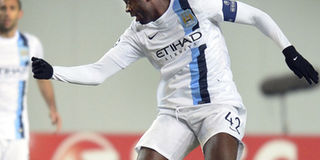Russia on defensive after Toure's racism claim

PHOTO | AFP Manchester's midfielder Yaya Toure controls the ball during the UEFA Champions League Group D match against CSKA in Moscow on October 23, 2013. Russia's football elite and the media reacted with disbelief after Manchester City's Ivorian captain Yaya Toure accused fans of racist chanting during the game. British reporters inside Moscow's packed Khimki Arena claimed hearing monkey chants coming from the home section.
What you need to know:
- Toure, City's Ivorian midfielder - who speaks some Russian after playing two seasons with Ukraine's Metalurg Donetsk - was adamant that the chanting was directed specifically at him.
- The Russian spokesman of the European football governing body UEFA Sergei Borisov told the ITAR-TASS news agency that he was at the match and "heard no racist chanting."
- Bad blood between the Moscow and London sport press has been running strong ever since Russia was awarded the 2018 World Cup after an ill-tempered campaign that featured English claims of vote buying.
MOSCOW
Russia's football elite and the media reacted with disbelief Thursday after Manchester City's Ivorian captain Yaya Toure reported racist chanting during the English giant's away clash at CSKA Moscow.
British reporters inside Moscow's packed Khimki Arena claimed hearing monkey noises coming from the spirited home section during City's 2-1 Champions League Group D victory Wednesday.
The accusations are particularly sensitive to Russia because it had won the right to host the 2018 World Cup after waging a bitter battle against front-runners led by England.
TOURE DISAPPOINTED
Toure, City's Ivorian midfielder - who speaks some Russian after playing two seasons with Ukraine's Metalurg Donetsk - was adamant that the chanting was directed specifically at him.
"Of course (I was aware). It is quite disappointing," Toure told British Sky television at the end of the game.
"It is unbelievable and very, very sad. We want to stop that and UEFA have to be strong, maybe close the stadium."
City manager Manuel Pellegrini added: "It is a pity that these things happen and I hope that the right measures (are taken)."
Toure's charges were splashed across British dailies' sports pages but received only the most incredulous mention in Moscow.
Russian state television's vesti.ru website admitted that "CSKA Moscow could face serious problems."
But the Moscow club's general director and its top players claimed hearing nothing offensive coming from the fans.
"We did not hear any chanting," CSKA general director Roman Babayev was quoted as saying by Russian media.
"Moreover, there were various calls and noises addressed at other players beside the dark-skinned ones."
Babayev promised to "carefully review the episodes mentioned by Toure" but insisted that reports of racist behaviour by the club's supporters were "premature."
DOUMBIA DEFENDS FANS
The Moscow club's Ivorian forward Seydou Doumbia agreed, even saying in an interview featured on the front page of Russia's popular Sport Express daily that his countryman "clearly overreacted."
"I've never heard any such thing from our fans," Doumbia said. "Sure, they loudly support our team and try to put as much pressure on the opponents as possible. But no one permits themselves racist chanting."
The Russian spokesman of the European football governing body UEFA Sergei Borisov told the ITAR-TASS news agency that he was at the match and "heard no racist chanting."
Borisov added he doubted that UEFA would take seriously Toure's comments even if the Premier League club decided to lodge a formal complaint.
"It is not a fact that this appeal would be reviewed (by UEFA)," he said.
"For a start, it has to be substantiated. ... According to my information, the (UEFA) delegate at the match did not make any records" of the alleged chanting.
Bad blood between the Moscow and London sport press has been running strong ever since Russia was awarded the 2018 World Cup after an ill-tempered campaign that featured English claims of vote buying.
Russia's Moskovsky Komsomolets tabloid was especially cynical about the amount of attention devoted to the controversy in the British media.
"This situation played right into the hands of the British media, which once again started playing the old record about how the 2018 World Cup was awarded to a country where racism flourishes," said the paper.
"The British media has long been waging a campaign to boycott major football tournaments played in Eastern European countries."





